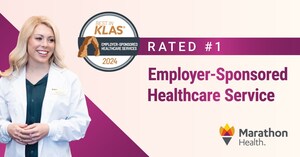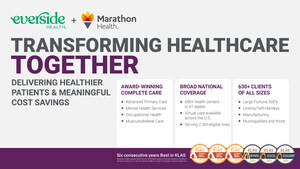Marathon Health Survey Reveals Healthcare Shortcomings and Need for Benefits Reassessment in Post-Pandemic Workplace
Research reaffirms healthcare as the #1 employee benefit, but spotlights disconnect between what employees want and employers deliver
WINOOSKI, Vt. and INDIANAPOLIS, July 20, 2021 /PRNewswire/ -- Marathon Health, a leading national provider of employer population health solutions, today released the findings of its 2021 Employee & Employer Healthcare Survey. The study, which examined employee and employer attitudes towards healthcare in the U.S., found that as Americans transition into the post-pandemic workplace, healthcare benefits remain mission critical, with the vast majority of employees (80%) and employers (70%) citing healthcare coverage as the most important benefit offered by their organization -- and the one most in need of change.
"While Americans prize healthcare above every other benefit, our survey also indicates employees and employers see major shortcomings in their healthcare plans. This is especially true when it comes to cost, preventive care, and mental health," said Jeff Wells, co-founder and CEO, Marathon Health. "There is also a big appetite for change from traditional offerings and a desire to form closer relationships with primary care providers – all in the name of increasing wellness versus managing illness. The good news is many of us, especially in the employer-based healthcare space, are already addressing these issues by delivering alternatives that produce better outcomes and cost savings."
Healthcare Benefits Need Improvement
The pandemic undoubtedly gave Americans ample reason and time to reflect on their employer-provided benefits. And while most survey respondents believe healthcare is the most crucial benefit, employees (35%) and employers (31%) also believe it is the benefit that needs the most improvement. Employees saw healthcare benefits needing the most improvement ahead of financial bonuses (18%) and 401K/retirement benefits (15%). Meanwhile, 17% of employers believe flexible work benefits need the next most improvement, followed by 401K/retirement benefits (15%).
This need to improve healthcare has been amplified by COVID-19, with over 63% of employers saying the pandemic has caused them to re-assess their healthcare offerings. The number rises to an eye-opening 69% among organizations with 5,000+ employees. And it's not just employers taking a look at their current offerings. Over 40% of employees say the pandemic caused their families to re-assess the healthcare provided by their employer.
Cost Is the Biggest Barrier to Employer Health Offerings
Both employees and employers cite cost as the biggest hurdle to improving their current healthcare plans. The out-of-pocket cost burden was identified as needing considerable improvement, especially for smaller businesses.
- Overall, 50% of employees and 43% of employers say the high cost of patient out-of-pocket expenses needs improving.
- The healthcare cost burden for small businesses was especially apparent, with 66% of HR decision-makers at organizations with less than 100 employees noting out-of-pocket costs of employee healthcare and health insurance needs to be improved. Comparatively, less than 45% of HR decision-makers at organizations with 5,000+ employees said the same.
Unfortunately, cost only seems to be increasing for both organizations and individuals, and added cost is not always synonymous with improved quality of care. Nearly 70% of employees say out-of-pocket costs have gone up over the past five years, but less than 53% say the quality of care has improved. Similarly, 77% of employers say they've seen increased healthcare costs during that period, and just under 59% say the quality of care available to their employees has improved.
Preventive Care is Taking Priority — But There's a Disconnect
According to past data from the Kaiser Health Tracking Poll, 62% of U.S. adults annually get physicals. According to responses from working age adults to Marathon Health's survey, this number decreased to 53% over the last 12 months, as the pandemic delayed preventive care visits and elective procedures. Forward looking, 77% of employees stated that they would like more help determining health issues such as diabetes and hypertension, signaling an active desire for increased preventive care. However, there appears to be a disconnect between how what employers think their health plan delivers and what employees experience.
- A majority of employees (65%) think their current health plan is primarily designed to manage illness and health issues while a majority of employers (58%) think it's designed to improve overall health.
- Only 35% of employees say their plan is designed for preventive care and improving their overall health.
The Next Generation of Healthcare
When it comes to determining future healthcare solutions to minimize cost and maximize preventive healthcare, employers and employees expressed interest in more immediate and direct healthcare offerings made available through employers.
- 79% of employers say they would be interested in offering a dedicated healthcare center for employees and their families to use exclusively — either on-site, near your office, or virtually.
- Nearly 81% of employees say they would take advantage of this kind of dedicated healthcare center offer.
- The least popular employee options for receiving care in the future were at pharmacies and big-box retailers.
Employees also expressed a desire for building a better relationship with their primary care provider. In fact, 74% of employees say a stronger relationship with their doctor and more time during each visit would help manage their health better. They're also increasingly open to hybrid solutions for building patient-doctor relationships, with 41% of employees saying their ideal option for seeing a doctor included at least some aspect of telemedicine or virtual care availability.
Mental health is also an area that employees and employers agree needs more focus post-pandemic. 63% of employees said the pandemic increased their levels of stress and employers reported increased employee healthcare claims regarding anxiety (54%) and depression (50%) amid the pandemic. As employees enter the post-pandemic workplace, 50% of employers would like to provide mental health services and 45% of employees said they'd like better access to these types of services.
About Marathon Health's 2021 Employee & Employer Healthcare Survey:
More than 1,100 full-time employees and 430 HR decision-makers in the U.S. were surveyed by Marathon Health. Responses from full-time employees were balanced by age, gender, and location based on the U.S. Census to ensure an accurate representation of the American working population. The research was conducted in June 2021. Survey highlights can be found on the Marathon Health website.
About Marathon Health
Marathon Health is lighting the way to better health, for everyone. We partner with employers around the United States to provide a modern approach to healthcare that truly meets employees' needs while saving money. We do this through a combination of onsite, Network and virtual health centers that integrate the best practices of advanced primary care, analysis and assessment, coaching and advocacy, behavioral health, occupational health, physical therapy, and chronic condition management independent of any hospital system or specialty network. Marathon Health was named Best in KLAS 2021 for its excellence in Worksite Health Services. For more information, please visit www.marathon-health.com.
Media Contacts: |
|
Sharen Santoski |
Kyle Austin |
617-755-6357 |
978-578-6296 |
SOURCE Marathon Health

Related Links
WANT YOUR COMPANY'S NEWS FEATURED ON PRNEWSWIRE.COM?
Newsrooms &
Influencers
Digital Media
Outlets
Journalists
Opted In





Share this article